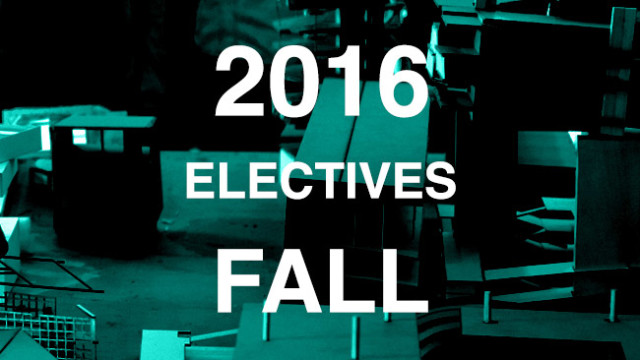Fall 2016 Electives
Elective courses available:
ARCH4020/CIVIL4020 Bedford Sem: Advanced Building Structures (Civil)
This interdisciplinary seminar consists of students from both the School of Architecture and Civil Engineering
department. Presentation of a variety of structural typologies bears direct relation to practical experience and the necessity for constructive interdisciplinary discourse. Specific structural typologies are examined through historic and contemporary project examples that are critically deconstructed and critically analyzed with respect to their basic engineering principles and architectural concepts. Students will be exposed to the collaborative methods inherent within the architect/engineer relationship. The course consists of lectures concerning each topic, case studies and presentations of relevant projects, an interdisciplinary design project and discussion of the projects and presentations with respect to interdisciplinary discourse. Content and delivery may vary by instructor. Staff R 6-8:50 pm. Cr. 3. Taught with CIVL4020. Prerequisite: Arch2230 Structures 1.
ARCH4840.01 Architectural Acoustics 1
Providing an overview of the essentials for architectural acoustics design of performance and public spaces, including concert halls, theaters, museums, classrooms, sports arenas, courtrooms, and religious buildings. The course may be used as a concentration in an architecture student’s professional electives, or the beginning of a master’s degree in acoustics. Covering basic principles of sound, room acoustics, sound absorption in rooms, sound isolation and privacy, acoustics of mechanical systems, and sound quality. After Architecture Acoustics 1 & 2, students should be prepared for a basic entry-level position in either acoustics in architecture, or in acoustical consulting. Todd Brooks F 10–11:50, F 12–1:50 pm. Cr 4. (can be used towards a minor in Acoustics).
ARCH4961.01 Duchamp Seminar: Anarchism Umped
(Architecture students, limit 10) Explore the life, work and influence of Marcel Duchamp (1887-1968), inventor of the readymade and father of conceptual art. By examining his ideas and those of his peers we will critically map his influence on 20th century art and architecture. Speculated as “the world’s first feminist artist” by curator Helen Molesworth, Duchamp continues to impact art discourse, 44 years after his death. Readings, response papers, field trips (to the Philadelphia Museum of Art) and discussions with two of the world’s leading Duchamp authorities, Francis Naumann and Michael Taylor. Michael Oatman. W 10–11:50 am. Cr 2.
ARCH4961.02 Duchamp Seminar: Anarchism Umped
(Non-Architecture students, limit 6)
ARCH4962.01 Porcelain Fabrics
This seminar will continue a research on the invention of different techniques to work with porcelain, exploring structures of light and shadow, opacity and translucency, motion and fixity, interiority and exteriority. It is a search for intensity in the experience of space in which light determines the formal explorations becoming sculpted material; a desire to carefully consider and stage the conditions for the phenomenological experience. E. Perez-Guembe. R 12 – 2pm. Cr. 2
ARCH4968.01 Information in us and around us
“Transformation of information is the fundamental building block of the universe” (Norbert Wiener, “Cybernetics”, 1948).The seminar will compare the dynamic process flows and the rivalry of different forms of information: biological, cultural and technological. Architecture plays important roles in this game and as a discipline of a wide spectrum, contains elements of all streams. Based on the theory of Universal Darwinism, which describe that natural evolution also explain principles of culture and technology, we will consider the various scenarios concerning of our future on this planet and beyond. This approach allows us a deeper analysis of our activity and understanding of consequences of our creative ambitions. Zbigniew Oksiuta. T 10-12. Cr. 2.
///
